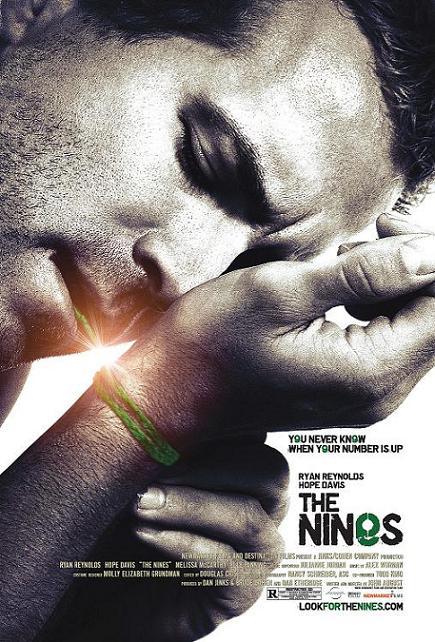The Nines
Previously known for his writing collaborations with Tim Burton on films like Big Fish, the Charlie and the Chocolate Factory remake, and Corpse Bride, John August takes his first step into the director’s chair with The Nines. A psychological thriller comprised of three short films, all of which star the same actors as different characters, with often overlapping stories. It brings up challenging questions about author and character, actor and role, creator and creation and is like a riddle in that the question is the answer: “How does it all add up?”
The film has three principal actors, all playing three different characters as the film progresses: Ryan Reynolds plays Gary, Gavin, and Gabriel, Melissa McCarthy plays Margret, a fictionalized version of herself named Melissa, and Mary, while Hope Davis stars as Sarah, Susan and Sierra.
Gary is a troubled actor living under house-arrest in someone else’s home, who is described as “a TV writer away on work.” While there he only befriends two people, his P.R. assistant Margret, and his neighbor Sarah. As he spends his time in the house he sees different versions of himself in the building, as well as finding the number nine in everything he does. People leave the writer telephone messages about “looking for the nines” while playing backgammon, he continually rolls only nines, and even the baby monitor left by Sarah speaks of the nines during the late of night.
Gavin, the second character portrayed by Reynolds is the writer spoken about above, who is currently trying to get a new television show off the ground and into the hands of a studio. Meanwhile he recruits Melissa to play the lead actress, and is assisted by studio executive Susan. The third and final set of characters is the creation of Gavin, as we watch his TV show. Father Gabriel takes his wife Mary and their child to the canyon for a weekend getaway, but after the car battery dies Gabriel is sent to look for help, which may or may not come in the form of Sierra. Sierra is both a blessing and a curse as she continually drugs Gabriel, but also cryptically tires to convince him to “come back to reality.”
The performances by all three here are stellar. Reynolds, McCarthy and Davis all have the keen ability to play different characters all at once, and give each one of them their own personality and persona, and quickly and smoothly transition between multiple creations in the same scene. However the showstopper comes in the form of Melissa McCarthy who easily steals the spotlight when she enters frame. All of her characters are fun and sweet, and bring an emotional sense of gravity and humor to an otherwise dark film.
Though it was released by an independent studio, and had a rather small budget, the film has great production values. From a technical standpoint the film looks great. It was shot on video rather than on film and uses the limited color pallet to perfection, and computer color correction capabilities to its advantage. The first film looks really sharp and crisp, while the second looks grainy and washed out, and the third with a light tint of grey that covers each shot. The score by Alex Wurman enhances the films dreamlike quality, and it has a rollicking soundtrack guaranteed to perk the ears of viewer. Editor Douglas Crise uses the films non-linear story structure to his advantage, with editing that keeps things lively and cool, the same can be said for cinematographer Nancy Schreiber who uses the camera as a quirky way of communicating ideas and emotions to the viewer, without beating us over the head with unnecessary amounts information.
What’s most important about The Nines is its story. John August has crafted is smart, witty, and fresh creation. His dialogue is snappy, fun, and quick, full of references and little anecdotes that make it sound very real. His use of non-traditional narrative structure keeps the pacing of the film lively and never does it slow down. However, the film ends on a rather odd note, and though it gives us hints and clues along the way that allow us to piece together what is going to happen, what is happening, or what has happened (depending on your perception of the film), you’re never quite sure how it will all connect together. By the end of it you learn that the film has it’s own strange theology about the world, and questions the morality of humans, and if we can indeed transcend to become higher beings or if we are forever forced to be in a traditional human form. The ending is guaranteed to divide audiences, some are going to just say “What?” and feel cheated, and others will embrace it as a sign of the modern age, and the pain that sometimes come with it, I fall into the latter category and feel that the film is perfectly tuned into it’s audience and time period. While John August certainly is an excellent screen-writer, he defiantly shows even more potential behind the camera, and I can’t wait to see what he does next.
I Give The Nines A:
4.5/5


No comments:
Post a Comment